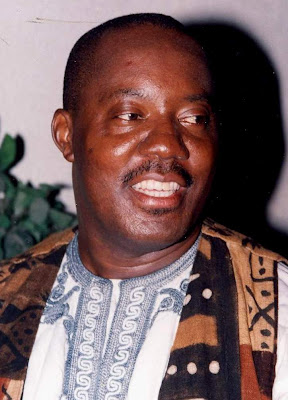 Nduka Otiono is currently FS Chia Scholar in the Department of English and Film Studies,
Nduka Otiono is currently FS Chia Scholar in the Department of English and Film Studies, The Piano Lounge of the Transcorp Hilton hotel,
My first encounter with Mr. Nduka Otiono was during my undergraduate days at the
I had anticipated a short meeting. But it was not to be. We spent over five hours sharing thoughts on the travails of the Nigerian nation. Our discussion moved from the poverty and hunger in the land to the Niger Delta crisis and then to the failure in leadership. For the first time in a long while, I was listening to an intellectually insightful dissection of the Nigerian conundrum. At a point, it became so emotional tears began to well up my eyes. We looked at the power sector in
In the course of our discussion, we were soon joined by one Mr. John, a friend of Mr. Otiono who works in one of the banks as a customer relations manager and later my good friend Ferdinand Adimefe, a budding author and youth corper serving at the Nigerian National Petroleum Corporation (NNPC) in
At a point, we were joined by Mr. Toni Kan Onwordi, Head of Corporate Communications, Visafone who exchanged banters with Mr. Otiono and then moved on. I had heard so much about Toni Kan (as he is popularly called), read a few of his write-ups and had come to admire him just like my big brother Tolu Ogunlesi who works in the same outfit. I wondered how the likes of this young man survived the frightful and sleazy conditions of the Nigerian media where you are constantly confronted with the two unpleasant options of starvation or having to embrace the brown envelopes. I saluted his resilience and prayed for some of my friends in the media who are fighting to remain men and women of honour in this untidy rat race of what may be termed for want of better description, a voodoo republic that thrives on the ‘lootocratic’ orgies of a heartless hegemony! I immediately recalled that Mr. Otiono had been in the Nigerian media for over a decade and once sat on the editorial board of the now world-famous Thisday newspapers. I do not intend to write Mr. Otiono’s biography. But I am convinced it was a good thing that happened to him when he experienced a paradigm shift from the Nigerian arena, proceeding overseas in order to retain the sanity of his body and mind.
The statistics are horrifying. I shivered with righteous indignation when UNODC boss Mario Costa mentioned that between 1960 and the present day, Nigerian leaders had stolen over $400 billion! With just $10 billion, the city of
If that is not enough to jolt you, Nigeria currently has about 10 million school age children out of school; 4.5 million are potential primary schools pupils and the other 5.5 million, young men and women who should be in secondary school. When you combine that with the about 60 million adult illiterates in the country, one can hardly see any light at the end of the tunnel. Maternal mortality rate in the country is put at 1000 to 100, 000 births in our labour rooms. That is equivalent to 10 plane crashes everyday! The Nigerian situation is akin to a grotesque theatre of the absurd whose spectators are a ruthless elite sitting, watching and satiated by this spectacle of blood, tears and sorrow. In the midst of this disillusionment, the mass of the Nigerian people remain resilient. This is still their country, their home and their fatherland. They are deeply troubled and are forced to ask questions. They want to know why poverty reigns in their fatherland. They want to know why those in the positions of responsibility continue to let this great country down. Nigerians are asking questions, but are they receiving and acting on the right answers?
I come to one sad conclusion. The problems of this great country are man-made and if there will be any solutions, it will have to come from Nigerians themselves. But who is ready to bell the Cat? Who can rescue this rogue republic from the hands of these pirates? Here again lies the tragic irony. We have a nation populated by some of the brightest brains on the face of the earth who individually are geniuses in their own rights but have never been able to collectively fix any problem they set out to solve. It is a tragedy that swings the way of pessimism, but history does not prove me wrong. We are confronted by a very strong cabal whose only interest in
But should we give up? A million times, NO! The change that we seek must prevail. We will not join them because we can beat them. It has not been an easy battle, but we must continue the fight and I see victory over this reign of mediocrity.


